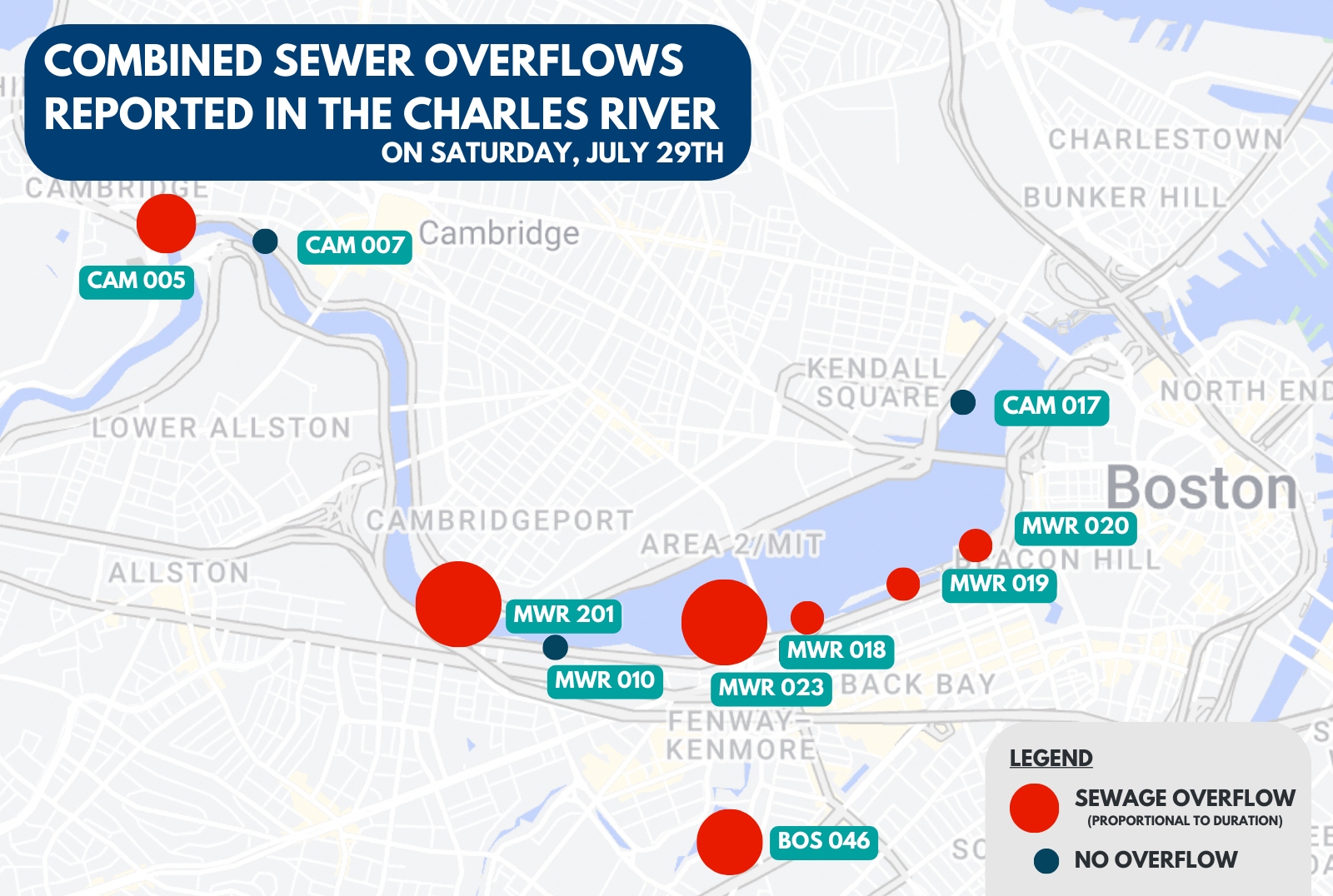Numerous Combined-Sewer Overflows (CSOs)in the Charles River Due to Heavy Rain
AUGUST 1, 2023: FOR IMMEDIATE RELEASE
BOSTON, MA––This past weekend, heavy rainfall caused seven combined sewer overflows (CSOs) to discharge untreated sewage for nearly 5 hours in the Charles River. This comes on the heels of the release of nearly 9 million gallons of sewage the weekend prior.
On Saturday evening, multiple Combined Sewer Overflows (CSOs) occurred, affecting the Lower Charles Basin from the Eliot Bridge to Museum of Science:
CAM005 discharged on 7/29/23 from 6:19pm to 8:53pm
MWR201 discharged on 7/29/23 from 6:32pm to 11:11pm
BOS046-1 discharged on 7/29/23 from 5:20pm to 5:55pm
BOS046-1 discharged on 7/29/23 from 8:30pm to 9:00pm
BOS046-2 discharged on 7/29/23 from 6:05pm to 6:25pm
MWR023 discharged on 7/29/23 from 5:15pm to 10:03pm
MWR018 discharged on 7/29/23 from 5:39pm to 6:25pm
MWR019 discharged on 7/29 from 5:30pm to 6:10pm
MWR020 discharged on 7/29/2023, 05:30pm to 06:05pm
Health Advisory: Public health officials recommend avoiding contact with the river during rainstorms and for 48 hours afterward, as there may be increased health risks due to bacteria or other pollutants.
Combined Sewer Overflows (CSOs) occur when heavy rain and intense storms overwhelm our outdated sewer systems. CSOs are technically illegal under the Clean Water Act, only allowable under a “variance” as long as efforts are being made to eliminate them. That is why for over three decades, sewage discharges have been allowed in the Charles River as the Massachusetts Water Resources Authority (MWRA), Boston Water & Sewer Commission (BWSC), and the City of Cambridge upgrade infrastructure and treatment facilities.
CSO discharge limits are set by a “Long Term Control Plan” (LTCP), stemming from the 1980’s Boston Harbor Cleanup Lawsuit. Currently, the LTCP mandates that less than 7 million gallons of sewage be released to the Charles in a typical year. However, increased precipitation frequently results in much more being discharged into the river. For example, in 2021, 126 million gallons were discharged into the Charles River, more than 18 times the allowed limit.
While significant progress has been made toward reducing sewage releases, today ten active CSO outfall pipes still discharge into the Charles. Of these, 5 lack any plan for achieving LTCP compliance. Consequently, CSOs routinely contaminate the most used stretch of the river, exposing river users to pathogens and imperiling public and ecological health. As climate change brings stronger, more intense storms, combined sewer overflows will become more frequent, further degrading the river.
“Combined Sewage Overflow is the most egregious example of negligence to the river but this is a solvable problem. Cambridge and Boston can look to cities like New York, Philadelphia, and Kansas City for how the smart combination of green and gray infrastructure can simultaneously achieve sewage control, relieve nuisance flooding, and help to green the cities,” says Max Rome, Stormwater Program Manager for Charles River Watershed Association.
“People are looking to Paris which is making the Seine swimmable in time for the 2024 Summer Olympics,” says Executive Director Emily Norton. “They ask us, why not Boston? And we agree - it’s long past time to end sewage discharges into the Charles, and make our river truly swimmable as well.”
Charles River Watershed Association is committed to working with MWRA, Cambridge, and BWSC to end sewage releases once and for all––the organization closely tracks discharges and impacts, keeps the public informed about the risks to safe recreation, and advocates for smart solutions like full sewer separation, the use of up-to-date climate predictions for increased rainfall and extreme weather, and rapid investment in green and gray infrastructure solutions to make sewer infrastructure more resilient to climate change. For more details visit CRWA’S website.
CONTACT:
Julia Hopkins
Communications & Outreach Manager
Charles River Watershed Association
(617) 540-5650 x 1071


